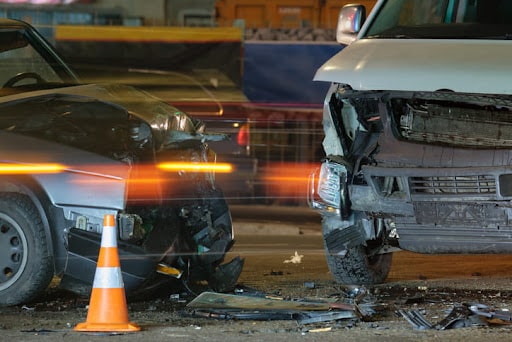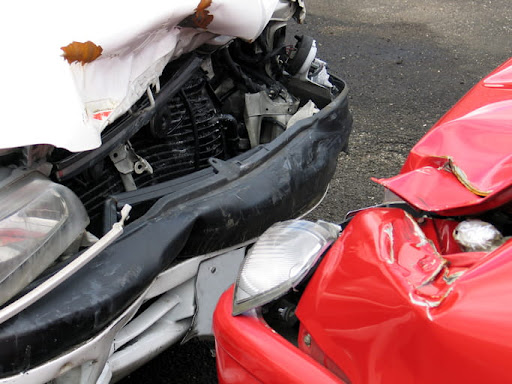Who Is at Fault in a Head-On Collision?

Head-on collisions can be dangerous and deadly car accidents. Determining who is at fault for the collision may seem straightforward. However, it can also be complicated when there are extenuating circumstances to consider. As such, knowing what to do after a head-on collision and how a car accident lawyer can help is essential.
If you were injured in a head-on collision, speak to one of our Tampa car accident attorneys for free to learn more about your legal rights and options.
What are the most common causes of collisions?
There can be various reasons why collisions occur. Some of the more common ones include:
- Distracted driving, such as texting, talking on the phone, eating, etc.
- Speeding or driving too fast for the conditions
- Driving under the influence of alcohol or drugs
- Failing to yield the right of way
- Running red lights or stop signs
- Poor weather conditions (rain, fog, snow)
- Following too closely or tailgating
- Making unsafe lane changes
- Drowsy driving or falling asleep at the wheel
- Poor visibility due to inadequate lighting or objects blocking the road
- Operating an unsafe vehicle with worn brakes, bald tires, etc.
- Defective vehicle mechanical components
- Challenging road conditions like sharp curves, potholes, blindspots, etc.
What is a head-on collision?
A head-on collision is a type of car accident in which two vehicles traveling in opposite directions collide with the front ends of each other. Head-on collisions are often some of the most serious types of accidents, as they can result in catastrophic injuries or death. Common causes of head-on collisions include distracted or impaired driving, speeding, and failing to yield the right of way.
How to determine who’s at fault in a car accident?
In most cases, the fault for a car accident is determined by analyzing the evidence and circumstances of the crash. The person found to be at fault may be liable for any damages that result from the accident in certain situations. Questions that can help determine who’s at fault include:
Who had the right of way?
- Was either driver speeding or otherwise driving recklessly?
- Was either driver distracted?
- Was either driver under the influence of drugs or alcohol?
- Did either driver fail to yield when turning or merging onto a road?
- Was visibility impaired due to poor weather conditions, inadequate lighting, or objects blocking the road?
Can both parties be at fault in an accident?
Yes, it is possible for both parties to be at fault in an accident. This is known as “shared fault” or “comparative negligence.” In these cases, each party may be held partially responsible for the damages resulting from the accident, depending on how much of the fault can be attributed to each party.
In a head-on collision, who is at fault?
In a head-on collision, fault usually lies with the driver who crossed the road’s centerline or was driving the wrong way. However, other factors can come into play in determining fault, such as distracted driving, impaired driving, or faulty vehicle mechanics. In some cases, both drivers may be found to have contributed to the accident and thus share liability for damages caused by the crash.
How does Florida’s “no-fault” law affect head-on collision injury claims?
In Florida, the “no-fault” law requires that all drivers carry insurance to cover their own medical expenses in the event of an accident. This means that regardless of who is at fault for a head-on collision, both parties can make claims with their respective insurers to cover their medical costs.
However, suppose the other party is determined to be at least 51 percent partially responsible for the accident. In that case, they may also be held liable for any additional damages, such as property damage and lost wages, that result from the crash.
What damages can I claim against the at-fault party?
If you are injured in a head-on collision and the other driver is found to be at fault, then you may be able to seek compensation for any economic and non-economic damages, including:
- Medical care
- Lost wages
- Property damage
- Pain and suffering
- Emotional distress
- Disfigurement
In some situations where a case goes to trial, a jury may award punitive damages if the other driver is determined to have been grossly negligent in their actions.
How does comparative negligence affect a head-on collision injury claim?
In cases where each party was partially responsible for the head-on collision, the less at fault can still seek damages from the other party. However, their settlement is reduced by the percentage they were considered at fault.
For example, one party is 75 percent at fault, and the other party is 25 percent at fault. The party who is 25 percent at fault has their car accident attorney file an injury claim. The case is settled, and the total amount of their settlement would be reduced by 25 percent. So, if the total compensation was $50,000, the amount is reduced by $12,500 (25 percent), and the actual settlement received is $37,500.
What if someone dies in a head-on collision?
If someone dies in a head-on collision, then the surviving family members may be able to bring a wrongful death claim against the driver, who is determined to be at fault for the accident. This type of claim allows surviving family members to seek compensation for:
- Medical costs
- Funeral expenses
- Present and future loss of wages
- Loss of consortium/companionship
- Pain and suffering
- Loss of insurance/retirement benefits
In some cases, punitive damages may also be awarded if it can be proven that the driver acted with gross recklessness.
What should you do after a head-on collision?
After a head-on collision, it is crucial to seek medical attention for any injuries as soon as possible. It is also important to gather evidence at the accident scene, such as photographs, eyewitness testimony, and contact information of any other drivers involved.
Additionally, you should contact your insurance company and a car accident lawyer in Florida who can help you understand your legal options in pursuing compensation for any damages resulting from the crash.
How does a car accident attorney help me?
A car accident attorney can help you understand your legal rights and options after a head-on collision. They investigate the circumstances of the crash and determine who is liable for any damages resulting from the accident.
An experienced attorney negotiates with insurance companies on your behalf to get you the compensation that you deserve. Additionally, they can represent you in court if it is necessary to take your case to trial to ensure your interests are protected.
How much does a head-on collision car accident lawyer cost?

When looking for a car accident lawyer near me for help filing a head-on collision injury claim, you want an attorney who offers a free case evaluation and consultation, like Jack Bernstein, Injury Attorneys.
In addition, you want a law firm that works on a contingency basis, as we do, which means you have no upfront legal fees. Instead, we will collect a percentage of the settlement or a favorable verdict if we win your case. Our goal is for you to concentrate on healing and recovery while we work hard to ensure you receive the compensation you deserve.
Get the settlement you deserve by speaking to one of our car accident lawyers in Florida today.
Sources:
FLA. STAT. § 627.7407. (2023).
FLA. STAT. § 766.118. (2023).
FLA. STAT. § 768.81. (2023).
